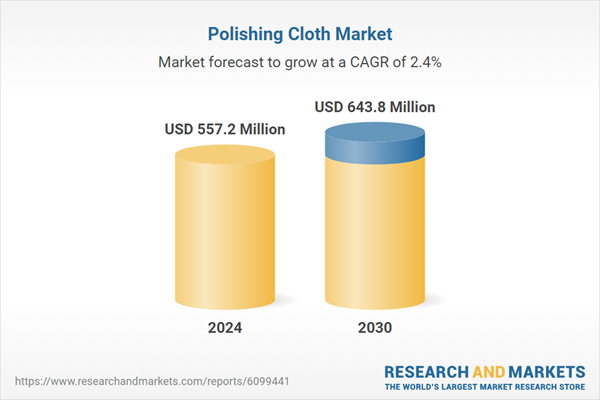Global Polishing Cloth Market - Key Trends & Drivers Summarized
What Role Do Polishing Cloths Play in Precision Cleaning and Surface Finishing?
Polishing cloths are indispensable in industries where fine surface finishing, precision cleaning, or defect-free visual appearance is required. These cloths are engineered for use across a range of materials - such as metals, glass, optics, ceramics, semiconductors, and automotive surfaces - making them highly versatile tools in manufacturing, maintenance, and consumer applications. Whether used to enhance reflectivity, eliminate scratches, or apply abrasive compounds, polishing cloths support a critical step in quality control and final product preparation across numerous sectors.Different types of polishing cloths - woven, non-woven, microfibre, suede, or synthetic blends - are formulated with specific abrasiveness, tensile strength, and absorbency characteristics depending on the application. In precision industries such as semiconductor fabrication, aerospace manufacturing, and optical lens production, these cloths are used with polishing slurries and compounds to ensure nanometer-level surface smoothness and geometric uniformity. At the consumer level, polishing cloths are popular for cleaning electronics, jewelry, musical instruments, and vehicle exteriors, often paired with waxes, polishes, or anti-static sprays. This broad usage spectrum is keeping demand robust across professional and retail segments alike.
How Are Material Science and Application-Specific Designs Enhancing Performance?
The evolution of polishing cloths has been closely tied to advances in fiber technology, surface engineering, and process compatibility. Microfiber-based cloths, composed of polyester and polyamide blends, offer superior softness, lint-free operation, and excellent dust-trapping capacity - making them ideal for sensitive electronics, camera lenses, and high-gloss surfaces. Diamond-impregnated and cerium oxide-treated cloths are used in high-end applications such as wafer polishing and optical lens finishing, where aggressive yet controlled abrasion is required.New generation polishing cloths feature dual-sided textures, layered structures, and surface coatings that allow users to alternate between coarse and fine polishing without switching tools. Anti-static, oil-repellent, and anti-microbial variants are being introduced to meet cleanroom, laboratory, and medical device manufacturing standards. Additionally, the incorporation of recyclable or biodegradable materials into polishing cloths reflects rising consumer and industrial demand for sustainable alternatives. With tailored designs for dry, wet, and slurry-based use cases, manufacturers are increasingly customizing cloths for application-specific efficacy and extended durability.
Which Industries and End-Use Segments Are Driving Growth Trajectories Globally?
The electronics and semiconductor sectors represent high-value end-users for polishing cloths, especially in wafer fabrication, display panel production, and electronic component finishing. Optical industries utilize ultra-fine polishing cloths for grinding and finishing lenses, prisms, and laser optics. In the metalworking industry, polishing cloths are essential for final-stage buffing of components used in aerospace, automotive, and tool manufacturing. Jewelry, watchmaking, and musical instrument businesses rely on soft-cloth polishing for restoring luster and removing tarnish from precious metals and fine surfaces.On the consumer front, the popularity of detailing products in automotive and home cleaning applications is driving robust retail demand. DIY car care kits, premium eyewear cloths, and reusable screen cleaners have become staple items, boosted by e-commerce and branding centered on quality and convenience. Regionally, North America and Europe lead in professional-grade cloth consumption due to advanced manufacturing and aftermarket services, while Asia-Pacific is witnessing strong growth fueled by electronics manufacturing hubs in China, South Korea, Japan, and Taiwan. Increased disposable incomes and lifestyle upgrades are further accelerating consumer-level adoption.
What's Powering the Expansion of the Global Polishing Cloth Market?
The growth in the global polishing cloth market is driven by several factors, including rising quality standards in manufacturing, increasing demand for precision finishing, and the shift toward sustainable, reusable cleaning tools. As industries invest in high-precision equipment and production lines, the need for defect-free surface preparation and post-processing is becoming critical. Polishing cloths play a central role in meeting these standards, particularly where automation and fine-detail finishing converge.Environmental awareness and regulatory policies are promoting washable, long-life cloths over disposable wipes in both industrial and domestic settings. Simultaneously, innovations in textile engineering and hybrid fiber blends are expanding product performance in terms of absorption, abrasion control, and chemical compatibility. As industrial, commercial, and consumer applications become more differentiated, polishing cloths are increasingly being sold as value-added, branded solutions tailored to end-user needs. With strong fundamentals in materials, surface science, and cleanliness standards, the polishing cloth market is poised for durable growth across global sectors.
Report Scope
The report analyzes the Polishing Cloth market, presented in terms of market value (US$). The analysis covers the key segments and geographic regions outlined below:- Segments: Product Type (Woven Polishing Cloth, Non-Woven Polishing Cloth); Material (Cotton, Microfiber, Synthetic Fiber, Wool, Other Materials); End-User (Automotive, Aerospace, Electronics, Metalworking, Healthcare & Medical, Construction, Other End-Users).
- Geographic Regions/Countries: World; United States; Canada; Japan; China; Europe (France; Germany; Italy; United Kingdom; Spain; Russia; and Rest of Europe); Asia-Pacific (Australia; India; South Korea; and Rest of Asia-Pacific); Latin America (Argentina; Brazil; Mexico; and Rest of Latin America); Middle East (Iran; Israel; Saudi Arabia; United Arab Emirates; and Rest of Middle East); and Africa.
Key Insights:
- Market Growth: Understand the significant growth trajectory of the Woven Polishing Cloth segment, which is expected to reach US$431.3 Million by 2030 with a CAGR of a 1.9%. The Non-Woven Polishing Cloth segment is also set to grow at 3.6% CAGR over the analysis period.
- Regional Analysis: Gain insights into the U.S. market, valued at $151.8 Million in 2024, and China, forecasted to grow at an impressive 4.6% CAGR to reach $122.6 Million by 2030. Discover growth trends in other key regions, including Japan, Canada, Germany, and the Asia-Pacific.
Why You Should Buy This Report:
- Detailed Market Analysis: Access a thorough analysis of the Global Polishing Cloth Market, covering all major geographic regions and market segments.
- Competitive Insights: Get an overview of the competitive landscape, including the market presence of major players across different geographies.
- Future Trends and Drivers: Understand the key trends and drivers shaping the future of the Global Polishing Cloth Market.
- Actionable Insights: Benefit from actionable insights that can help you identify new revenue opportunities and make strategic business decisions.
Key Questions Answered:
- How is the Global Polishing Cloth Market expected to evolve by 2030?
- What are the main drivers and restraints affecting the market?
- Which market segments will grow the most over the forecast period?
- How will market shares for different regions and segments change by 2030?
- Who are the leading players in the market, and what are their prospects?
Report Features:
- Comprehensive Market Data: Independent analysis of annual sales and market forecasts in US$ Million from 2024 to 2030.
- In-Depth Regional Analysis: Detailed insights into key markets, including the U.S., China, Japan, Canada, Europe, Asia-Pacific, Latin America, Middle East, and Africa.
- Company Profiles: Coverage of players such as ABI Scientific, Inc., Ambe Phytoextracts Pvt. Ltd., Basic Nutrition, Bioriginal Food & Science Corp., Botanic Healthcare and more.
- Complimentary Updates: Receive free report updates for one year to keep you informed of the latest market developments.
Some of the 43 companies featured in this Polishing Cloth market report include:
- 3M Company
- ARC Abrasives Inc.
- Autoglym
- Buehler
- Carborundum Universal Limited
- Deerfos Co., Ltd.
- DuPont
- E-cloth
- Hermes Abrasives Ltd.
- Indasa USA Inc.
- Keystone Abrasives
- KLINGSPOR Abrasives Inc.
- Meguiar's Inc.
- Mirka Ltd.
- Norton Abrasives
- Saint-Gobain Abrasives
- Schaffner Manufacturing Company, Inc.
- sia Abrasives Industries AG
- Stanley Black & Decker, Inc.
- Struers
This edition integrates the latest global trade and economic shifts into comprehensive market analysis. Key updates include:
- Tariff and Trade Impact: Insights into global tariff negotiations across 180+ countries, with analysis of supply chain turbulence, sourcing disruptions, and geographic realignment. Special focus on 2025 as a pivotal year for trade tensions, including updated perspectives on the Trump-era tariffs.
- Adjusted Forecasts and Analytics: Revised global and regional market forecasts through 2030, incorporating tariff effects, economic uncertainty, and structural changes in globalization. Includes historical analysis from 2015 to 2023.
- Strategic Market Dynamics: Evaluation of revised market prospects, regional outlooks, and key economic indicators such as population and urbanization trends.
- Innovation & Technology Trends: Latest developments in product and process innovation, emerging technologies, and key industry drivers shaping the competitive landscape.
- Competitive Intelligence: Updated global market share estimates for 2025, competitive positioning of major players (Strong/Active/Niche/Trivial), and refined focus on leading global brands and core players.
- Expert Insight & Commentary: Strategic analysis from economists, trade experts, and domain specialists to contextualize market shifts and identify emerging opportunities.
Table of Contents
Companies Mentioned (Partial List)
A selection of companies mentioned in this report includes, but is not limited to:
- 3M Company
- ARC Abrasives Inc.
- Autoglym
- Buehler
- Carborundum Universal Limited
- Deerfos Co., Ltd.
- DuPont
- E-cloth
- Hermes Abrasives Ltd.
- Indasa USA Inc.
- Keystone Abrasives
- KLINGSPOR Abrasives Inc.
- Meguiar's Inc.
- Mirka Ltd.
- Norton Abrasives
- Saint-Gobain Abrasives
- Schaffner Manufacturing Company, Inc.
- sia Abrasives Industries AG
- Stanley Black & Decker, Inc.
- Struers
Table Information
| Report Attribute | Details |
|---|---|
| No. of Pages | 391 |
| Published | January 2026 |
| Forecast Period | 2024 - 2030 |
| Estimated Market Value ( USD | $ 557.2 Million |
| Forecasted Market Value ( USD | $ 643.8 Million |
| Compound Annual Growth Rate | 2.4% |
| Regions Covered | Global |









